Friday Feb 20, 2026
Friday Feb 20, 2026
Thursday, 2 May 2019 01:25 - - {{hitsCtrl.values.hits}}

Communication theories in crisis situations will suggest to us many strategies by way of catastrophe management, activating contingency plans, deploying promotional campaigns, etc.
All efforts being made after a damage of this magnitude are to bring the industry to where it was and yet it is easier said than done, especially when the victims include a considerable number of tourists, with some being known for their social standing.
The nature of the attack, extreme ideologies and shifting of locations, geopolitics to arms trade and specially the hands that drive these acts to create instabilities in soft targets like Sri Lanka are beyond tourism authorities in spite of the vulnerability of tourism as an industry for consequences.

Reviving the tourism industry through a communication plan is not waving a magic wand. That needs to be understood when rushing for decisions as some of the hurriedly-done campaigns (when the inboxes get flooded with cancellations following travel advisories) would not have that much of credibility.
As for tourism, the need of the hour is to develop subtle messages generated through credible sources to primary and secondary markets. The real communicator or the institution need not be highlighted after official statements are issued, if the target audiences are correctly identified whether trade or consumers, noting that trade cannot convince the traveller at a time Sri Lanka is still making world headlines.
Such messages, specially transmitted through cyber space and digitally, must have strong underpinning security measures being taken with the belief that ‘time heals’ as Sri Lanka in any event is a gifted country for tourism. Meanwhile the tourism authorities could pay more attention to long-awaited matters.
Skills development in tourism – It is no use to lament that the country has no skills when the industry returns to normal. The situation is more volatile with some having second thoughts to shift to other disciplines. Assuring them of a future here or elsewhere and making proper assessments to have the numbers required in respective fields are important.
Encouraging domestic tourism – when the economic crisis hit Malaysia, the public was urged to avoid overseas travel and take holidays within. Similar approach can be made to urge Sri Lankans to have their holidays in Sri Lanka with discounts offered through collective agreements considering the perishable nature of tourism products and services.
Apply Passikudah and Yala models to all identified locations and review Kuchchaveli, and Kalpitiya. Also revive plans for Jaffna, Mannar, Silawathura, and Madhu Road. This is an ideal time to work on those to make investors’ life easier.
Have the gazette ready for all products and services including ratification of lacunas in current regulations and implement them when the time is right. This includes carrying capacity with special reference to Yala, Wilpattu, Unawatuna and Ella.
Develop authentic language schools and move beyond French and German to Chinese, Hindi, Russian, Japanese, Spanish, Indonesian, Thai, and Philippines, which would well be new markets to tap.
Tourism authorities must strengthen the work with the Tourist Police to offer the required ‘privacy’ to tourists and control movements of touts to reduce harassment. With the current loss of business, this would go out of hand if not controlled through the laws and education.
The investments will have a setback at present. Complete the work on the much-needed land bank and further strengthen the tourism one stop unit with cooperation from other line ministries and departments.
Garbage and waste management – We have seen tourists themselves setting examples by picking up garbage. Let this not happen again in this country. Tourism authorities could take initiative with local governments in tourism areas.
Training security needs to go beyond just checking bags. Many private security companies pay inadequate salaries and we are informed that some of those security people are actually famers who come to the city where they face crop failures.
There are four Master Plans – 1993 the late Dharmasiri Senanayake, 2009 Milinda Moragoda, 2011 Basil Rajapaksa, 2017 John Amaratunga) and they all spell out what the tourism industry needs. The 1993 plan offers a comprehensive development strategy which is still valid. Let an action plan be derived from these with timelines leaving room for the current situation.
Look at ways and means of developing other infrastructure viz. facilities in the airport, making Mattala viable, develop cruise terminal, etc., bearing in mind that Port City will also change the landscape of city tourism.
Sri Lanka has paid a heavy price for overemphasis on short-term plans and this would be an ideal opportunity to view these areas although they do not offer immediate political gains. As far as communication is concerned, let there be realistic approaches in coordination with defence and foreign ministries as the immediate future is contingent upon assurance of security and the length of travel advisories.
(The writer is formerly Director Marketing – Tourist Board 95-97,Senior Sri Lankan Diplomat 97-2005, CEO – SL Convention Bureau 2005-2016, Director General – SLTDA 2011-2013, and currently Senior Lecturer in Tourism, Marketing and Event Management.)